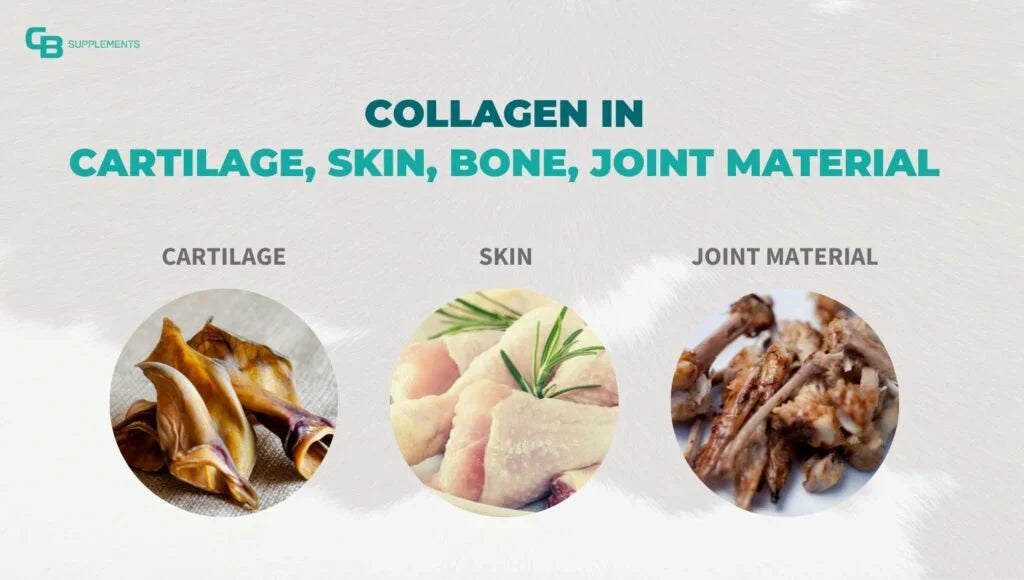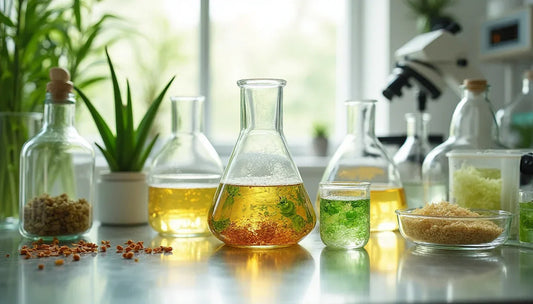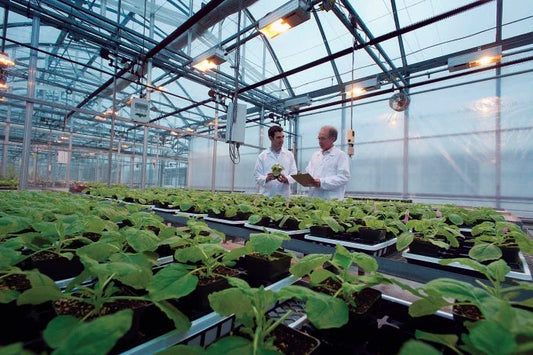Science-backed results show remarkable differences between vegan and traditional collagen supplements. The human body's total protein consists of about 30% collagen, which acts as the foundation of bodily structure. Most people's bodies produce nowhere near as much collagen at age 60 as they did in their youth. This reduction has accelerated interest in supplements, and research proves vegan collagen cuts wrinkles by 27.5%, enhances skin texture by 20.1%, and reduces pores by 12.3% compared to placebo groups.
The distinct mechanisms between collagen and collagen boosters need careful consideration. Traditional animal collagen serves as a powerful anabolic source because our bodies digest and absorb it quickly to boost muscle protein synthesis. Vegan alternatives enhance collagen density by 4.7% and elasticity by 5.1%. Americans get 65% of their protein from animal sources, which highlights another key difference between vegan and animal collagen. The choice between vegan and animal collagen depends on individual health goals. Plant-based formulas boost skin hydration by 4.3%, while animal collagen supplements substantially increase bone mineral density in postmenopausal women. This detailed piece compares vegan collagen and collagen from animal sources by analyzing their benefits, effectiveness, and scientific evidence.
Animal vs Vegan Collagen: Key Differences in Source and Structure
Image Source: MDPI
The main difference between animal and plant-based collagen comes from their biological origin and molecular makeup. These differences help explain why each type has specific benefits for people who want collagen supplements.
Difference Between Vegan and Animal Collagen Explained
Animal collagen supplements contain actual collagen protein that comes from hooves, bones, and hides of animals - mostly cows (bovine) or fish (marine) [1]. Vegan collagen products work differently since plants don't make this protein. These plant-based alternatives give your body nutrients that help it make its own collagen [2].
This creates a key difference in how they work. Animal collagen gives you ready-made collagen peptides. Vegan options provide the raw materials your body needs to make more collagen [3]. Animal collagen might be labeled "natural," but it can contain traces of antibiotics, hormones, and environmental toxins from factory farming [1].
Amino Acid Profiles: Glycine, Proline, Hydroxyproline
Collagen's strength comes from its unique amino acid makeup. Three amino acids - glycine, proline, and hydroxyproline - make up about 57% of collagen's total amino acids [4]. These amino acids create the triple helix structure that makes collagen strong and stable.
Glycine makes up about one-third of collagen's amino acid sequence. Proline and hydroxyproline make up the rest of that crucial 57% [4]. Animal supplements give you these amino acids in their natural collagen form. Vegan supplements typically include:
-
Individual amino acids (glycine, proline)
-
Vitamin C (essential for collagen biosynthesis)
-
Minerals like silica, zinc, and copper that act as cofactors
-
Antioxidants that protect existing collagen
Why Plants Can't Naturally Produce Collagen
Plants don't have what they need to make collagen. They lack both the genes and biochemical pathways to create this complex protein [5]. The triple-helix structure and specific amino acid sequence of collagen just doesn't exist in plants.
Plants can provide some basic amino acids but not in the specific way collagen needs them [5]. Plants also can't make hydroxyproline - this modified amino acid only forms during collagen production in animals [6].
Scientists are working on creating "vegan collagen" using genetically modified yeast and bacteria [2]. Most vegan collagen products today help your body make more of its own collagen rather than giving you the actual protein [5].
Bioavailability and Effectiveness: Which Collagen Works Better?
Bioavailability determines how well supplements deliver nutrients to your body. Your body's response to collagen products depends heavily on absorption rates and protein quality.
Digestibility Scores: PDCAAS vs DIAAS
Protein quality measurements show a significant difference between vegan and traditional collagen. Animal collagen scores zero on the Protein Digestibility-Corrected Amino Acid Score (PDCAAS) when it lacks tryptophan [7]. Adding tryptophan doesn't help much - collagen still remains an incomplete protein because it doesn't have enough essential amino acids [8].
A newer study, published by DIAAS, also gives hydrolyzed collagen a zero rating [8]. All the same, research shows you can get up to 36% of your dietary protein from animal collagen while keeping optimal amino acid balance in the standard American diet [7].
Hydrolyzed Peptides vs Free-Form Amino Acids
Your body absorbs collagen supplements differently based on their molecular structure. Enzymes break down hydrolyzed collagen into smaller peptides. This is a big deal as it means that absorption rates reach 90% compared to only 27% for dietary collagen [9].
Research reveals something unexpected about collagen absorption. Mass spectrometric analysis found larger peptides—including pentadecapeptides—in the bloodstream after consumption [10]. Scientists previously thought only tiny fragments could enter the bloodstream.
Vegan collagen alternatives usually contain free-form amino acids or biomimetic tripeptide structures that copy the glycine-proline-hydroxyproline sequence found in human collagen [11]. These structures might help your body recognize them better.
Is Vegan Collagen Better Than Animal Collagen for Skin?
Clinical evidence shows promising results for vegan formulations. An 8-week study found that vegan collagen boosted collagen density by 4.7% and elasticity by 5.1% compared to placebo groups [1]. More impressive results showed wrinkle reduction by 27.5%, texture improvement by 20.1%, and pore size decrease by 12.3% [1].
People who promote marine collagen say its smaller molecular weight allows 1.5 times better absorption than other sources [12]. Those who support vegan options point out that plant-based formulations offer complete amino acid profiles—including tryptophan that animal collagen lacks [13].
Both options ended up showing good results for skin improvement. Your choice might depend on your priorities, sustainability concerns, and specific formulations.
Health Benefits Compared: Skin, Hair, Joints, and Bones
Clinical research shows clear differences between vegan and animal-based collagen supplements and their effects on body systems.
Clinical Trials on Vegan Collagen Peptides
Plant-based formulations have shown promising results in recent studies. Vegan collagen improved skin's elasticity by 5.1% and boosted collagen density by 4.7% when compared to placebo groups [1]. These plant-based options reduced wrinkles by 27.5%, enhanced texture by 20.1%, and shrank pore size by 12.3% [1]. Research found that vegan collagen-builder formulations boosted hair growth rates between 38.54-50.37% at different dosages [3]. Participants who took a 10g dose saw their hair density increase by 19.64% and thickness improve by 20.51% [3].
Animal Collagen for Bone Density and Joint Pain
Animal-derived collagen proves highly effective for skeletal health. A groundbreaking four-year study showed that women after menopause who took 5g specific collagen peptides daily had better bone mineral density in their spine and femoral neck. No fractures occurred during the study period [14]. Research revealed that taking 5g of bovine collagen twice daily for 13 weeks helped patients with knee osteoarthritis [14]. Later studies confirmed positive effects on recovery (ES=0.66), less discomfort (ES=0.64), and reduced pain during movement (ES=1.12) after collagen supplementation [14].
Muscle Recovery and Protein Synthesis Differences
Animal-derived protein works better as an anabolic source because the body digests and absorbs it quickly, which enhances muscle protein synthesis [15]. Research teams discovered that eating an omnivorous meal with beef increased muscle protein synthesis rates 47% more than similar whole-food vegan meals in healthy older adults [14]. Plant proteins don't perform as well because they contain fewer essential amino acids (especially leucine) and are harder to digest [15].
Sustainability, Ethics, and Product Transparency
Consumer choices now extend beyond nutrition. Environmental and ethical aspects of collagen products shape buying decisions. The gap between traditional and plant-based options creates a dilemma for eco-conscious buyers.
Environmental Impact of Animal Collagen Production
Animal collagen production damages our environment more than most people realize. Brazilian cattle ranching destroys 80% of the Amazon forest [16]. Two Brazilian collagen companies' supply chains alone have destroyed 2,600 square kilometers of forest [17]. Industry players often claim collagen as just a "byproduct" of meat production. The truth reveals that non-meat products, including collagen, make up half a cow's weight and generate 20% of meatpackers' profits [17]. Ranchers clear more forests for grazing land because of this profit motivation [18].
Non-GMO and Fermentation-Based Vegan Collagen
Plant-based alternatives help protect biodiversity and cut carbon emissions while using fewer resources [18]. Sustainable plant ingredients like fruits, vegetables, and algae produce most vegan collagen sources without depleting natural resources [18]. Microbial fermentation methods show great promise as they need nowhere near the land, water, and resources that traditional animal farming requires [18]. Modern companies now create vegan collagen through cell culturing—a "slaughter-free" method that uses genetically modified yeast and bacteria [4]. This technique places human genes that code for collagen into microbes and produces building blocks for human collagen [4].
How to Spot Misleading Vegan Collagen Marketing Claims
Real collagen doesn't exist naturally in plants, so the term "vegan collagen" needs careful review [19]. No official authorities regulate these claims yet. However, third-party certification programs like the Collagen Verified program under NutraStrong help validate marketing statements [4]. A full picture should check whether products have independent clinical testing instead of just supplier data [19]. Companies should openly share amino acid sources [4]. Product labels must match ingredients—too many products show "vegan collagen" but list bovine sources in their ingredients [4].
Conclusion
Scientific research backs the unique benefits of both vegan and animal collagen supplements. Your health goals, priorities, and ethical views will help determine which option works best for you. Animal collagen gives your body ready-made peptides that make up the natural collagen you lose with age. This becomes vital after 60 when your body's collagen levels drop substantially. Plant-based options have shown impressive results in clinical studies even though they don't contain actual collagen - they provide what your body needs to make its own.
Research shows each approach has its strengths. Animal-derived supplements are great at improving bone density and joint health. Women after menopause see remarkable results. These supplements digest quickly and build muscle protein better than plant proteins. The vegan options have proven their worth too. Clinical trials show they reduce wrinkles by 27.5% and make skin texture 20.1% better.
Environmental and ethical concerns shape many people's choices. Animal collagen production leads to deforestation and destroys habitats. Plant-based alternatives need fewer resources and leave a smaller carbon footprint. New technologies like fermentation and cell culture methods could bridge the gap between animal and plant options in an environmentally responsible way.
You need to look carefully at product labels when buying collagen supplements. Some products might trick you with "vegan collagen" labels since plants can't make real collagen. Getting the full picture means checking ingredient lists, third-party certifications, and clinical testing results.
Scientists keep finding new ways to make collagen from both animal and plant sources. There's no one-size-fits-all answer - the best supplement matches your specific health needs, values, and lifestyle. Whether you pick hydrolyzed animal peptides or plant-based collagen builders, knowing these key differences helps you choose the right supplement to improve your skin, joints, muscles, and overall health.
FAQs
Q1. How does vegan collagen compare to traditional animal-derived collagen? Vegan collagen alternatives provide nutrients that support the body's natural collagen synthesis, while animal-derived collagen supplements contain actual collagen protein. Both types show effectiveness, with vegan options demonstrating improvements in skin elasticity and collagen density, while animal collagen excels in bone and joint health.
Q2. Are collagen peptides more effective than regular collagen supplements? Collagen peptides, which are hydrolyzed forms of collagen, are generally considered more effective. They are broken down into smaller molecules, making them easier for the body to absorb and utilize. This increased bioavailability can lead to better results in supporting skin, joint, and bone health.
Q3. What are the main sources of vegan and animal collagen? Animal collagen is typically sourced from cow (bovine) or fish (marine) byproducts. Vegan collagen alternatives are derived from plant-based ingredients like fruits, vegetables, and algae. Some companies are also developing bioengineered vegan collagen using genetically modified yeast and bacteria.
Q4. Which type of collagen is best for skin health? Both vegan and animal-derived collagen supplements have shown benefits for skin health. Recent studies on vegan collagen alternatives have demonstrated significant improvements in skin elasticity, texture, and wrinkle reduction. However, Type I collagen, which is abundant in animal-derived supplements, is often considered particularly beneficial for skin health.
Q5. How do environmental and ethical factors influence the choice between vegan and animal collagen? Environmental concerns play a significant role in the choice between vegan and animal collagen. Animal collagen production has been linked to deforestation and habitat destruction, particularly in the Amazon. Vegan alternatives generally require fewer resources and produce lower carbon emissions. Additionally, ethical considerations regarding animal welfare may influence some consumers to choose plant-based options.
References
[1] - https://www.sciencedirect.com/science/article/pii/S1756464623005558
[2] - https://www.webmd.com/beauty/vegan-collagen-what-to-know
[3] - https://pubmed.ncbi.nlm.nih.gov/38989962/
[4] - https://www.vitafoodsinsights.com/skin-health/more-education-needed-to-counter-misleading-vegan-collagen-claims-says-industry-body
[5] - https://timesofindia.indiatimes.com/life-style/health-fitness/health-news/plant-based-collagen-is-it-a-myth-or-reality/articleshow/122848704.cms
[6] - https://www.amymyersmd.com/blogs/articles/plant-based-collagen
[7] - https://pmc.ncbi.nlm.nih.gov/articles/PMC6566836/
[8] - https://pmc.ncbi.nlm.nih.gov/articles/PMC10131182/
[9] - https://www.iprogressivemed.com/collagen-peptides/
[10] - https://pubmed.ncbi.nlm.nih.gov/29467346/
[11] - https://goldmanlaboratories.com/blogs/blog/vegan-vs-animal-collagen-which-actually-works-better-2025-guide?srsltid=AfmBOoouBKAQ6g16NRNrU1ZRvfz616Zzn-mYiQnel-3cbpREAidiEpcA
[12] - https://eu.absolutecollagen.com/blogs/features-testimonials/different-types-of-collagen-an-a-z-guide
[13] - https://wearefeel.com/blogs/learn/what-is-vegan-collagen-benefits-risks-comparison-guide?srsltid=AfmBOoqYAu7vLBpmDoQHJezXhZUL20R0VRIKRF31NHrXSCOBP1bZZegN
[14] - https://goldmanlaboratories.com/blogs/blog/vegan-vs-animal-collagen-which-actually-works-better-2025-guide
[15] - https://pmc.ncbi.nlm.nih.gov/articles/PMC7551889/
[16] - https://www.theguardian.com/environment/2023/mar/06/collagen-linked-brazilian-deforestation
[17] - https://www.thebureauinvestigates.com/stories/2023-03-06/collagen-wellness-industrys-star-product-drives-deforestation-and-rights-abuses
[18] - https://goldmanlaboratories.com/blogs/blog/vegan-vs-animal-collagen-which-actually-works-better-2025-guide?srsltid=AfmBOoqKq8sg8p9QbmlUWfiB6kzaxv_JKPo063mt0q8-7lH88D8aaz8Z
[19] - https://goldmanlaboratories.com/blogs/blog/vegan-collagen-supplements-tested-the-truth-about-their-effectiveness-2025-lab-results?srsltid=AfmBOooYLpABbU-O-oZ7GzGNqKzCJr4uzXJd9XLJmUGp8lPtCK3kbWbL




